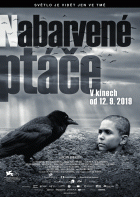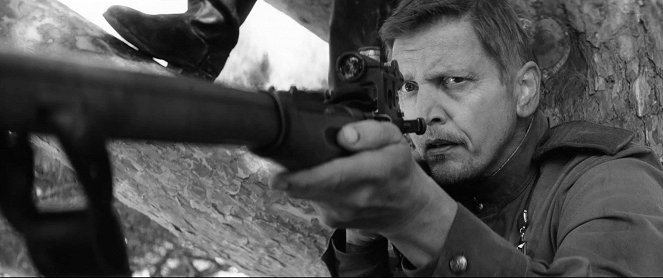Directed by:
Václav MarhoulScreenplay:
Václav MarhoulCinematography:
Vladimír SmutnýCast:
Petr Kotlár, Udo Kier, Michaela Doležalová, Zdeněk Pecha, Lech Dyblik, Jitka Čvančarová, Stellan Skarsgård, Harvey Keitel, Julian Sands (more)VOD (1)
Plots(1)
Trying to protect their child from the mass extermination of Jews, a Jewish couple sends their son to a relative in the countryside somewhere in Eastern Europe. However, the boy's aunt dies unexpectedly and the child is forced to set out on a lone journey through the wild and hostile world governed only by local rules, prejudices and superstitions. When the war ends, his fight for physical survival is replaced by a different kind of a fight. A battle he may not even be aware of, a battle with himself, a battle for his soul, his future... (Bioscop)
(more)Videos (4)
Reviews (11)
Before the premiere, I had some doubts about whether the director was capable of handling a demanding and controversial subject. He didn't embarrass himself and instead brought out the best of himself and his vision is definitely worth seeing in the movie theater, which cannot be said about the overwhelming majority of Czech films. Marhoul managed the production perfectly. A film with such a big budget and a concentration of top-notch film specialists and significant foreign actors has been missing from Czech cinema for a whole decade and will probably be missing again for many years to come. The Painted Bird does not represent a trend or a glimpse of better times - it is a solitary work that nothing can follow, and at most, it can serve as a positive example for future visionaries. Marhoul has seen a lot and is not afraid to make use of it. The great camera work by Vladimír Smutný, the black and white material, and the division of the film into chapters reference Marketa Lazarová, and Marhoul consciously build on Come and See by involving Aleksei Kravchenko; cinephiles will surely find many other references, be it to the work of Jan Němec or other classics. The problem is that, despite all his efforts, Marhoul lacks something substantial to become a world-class filmmaker. He is unable to work with the pace and rhythm of the film and he is monotonous and repetitive. My daughter, who accompanied me, admitted after the screening that she was perfectly tuned into the film in the first ten minutes, only to realize with horror that she had to endure another nearly three hours of the same thing. If the director had shortened the film by half an hour, nothing would have changed in its essence and any viewer without knowledge of the source material would not have noticed. The Painted Bird is a sequence of beautiful film images that I approvingly nod my head at, but they evoke almost no emotions in me (if they do, then it is in inappropriate places. The torture, rape, and perversion sometimes reach the point that even the famous Marquis de Sade would find erotic pleasure in them. I had fun during the scenes of the two insatiable nymphomaniacs, but otherwise, it's not what the director had in mind.) A film full of tragedy and violence should completely crush me emotionally - with Volhynia, Come and See, or Nanking, that eventually happened. Not here, though. The main character goes through hell with the same absent expression, and the viewer cannot empathize with his thinking. More dialogue is missing, as well as depth. I feel like a member of an inventory commission who checks off item after item, one shot after another, and thinks about how nicely the director, as the chairman of the commission, prepared it for him... Sometimes I pause, for example when I watch the scene of a village being massacred by collaborating Cossacks, while the Red Army is attacking them from behind. In their situation, I would have completely different worries... In my opinion, Marhoul somewhat overestimated his abilities, but I consider four stars as a fair share of encouragement that Czech cinema desperately needed. Overall impression: 70%.
()
(less)
(more)
Ideally, Czech cinematography should have a big, ambitious film like this at least a couple of times a year, so one The Painted Bird wouldn’t get such an aura. But we don’t have that and with this work Marhoul is objectively several streets head of any recent Czech competition, and they simply can’t catch him. A great and stylish film, world-class. I didn’t enjoy it enough for a five-star rating because it’s not really possible to “enjoy” it. It is exhausting, rather. But a well earned four starts, without any doubt. Now, to create a media aura around this film as if it was some sort of exploitation war horror movie is incredibly absurd. Sure, there are some horrible and monstrous things, but Marhoul approaches them with a lot of decency, with chastity almost. And if the hysterical responses from Venice are anything to go by, it's just that the snobs from these big festivals like to fall into cheap headlines ... and that crap will last.
()
This film is saved by its black-and-white cinematography, framing and lighting, as well as by the depiction of the era with the right set designs and costumes. The narrative structure, however, is completely monotonous, devoid of any dramatic arc, artistic symbolism, more sophisticated editing techniques and internal emotional development, which could have been at least partially provided by (unfortunately completely absent) music. The Painted Bird misses most of what this type of film needs. The characters have well-chosen faces, but they only appear for a few minutes, barely speak and give nothing to the film. Their ugliness just contributes to the premature loss of the boy’s innocence in a nasty environment. And we come to understand that this loss is the point of the whole film only in the last few minutes, after almost three hours of monotonous stacking of the similarly looking and sounding episodes on top of each other.
()
After Tobruk, Václav Marhoul convinced me for the second time that he and I are simply not on the same wavelength. Now, after the almost three-hour ‘frantic ride,’ I can’t help but wonder what he wanted to convey with this film. Next to Come and See and Hatred, The Painted Bird feels rather underwhelming. The information that the story takes place during WWII came to me only in the form of a Storch flying over, other indications appeared much later. I still don't know where the story was set (Carpathian Ruthenia?). I also didn't understand why the little Jew was played by a Gipsy. The story unfolded in a very awkward way. Throughout the film I felt like it was weirdly cut, I was annoyed by its strange rhythm: boring, boring, boring - brutal violence - boring, boring, boring - brutal violence - boring, boring, boring – pedophilia - boring, boring, boring - zoophilia, etc. I also didn't understand why there was violence in the film in the first place when the creators were obviously more afraid of it than the viewers. That way, most scenes look silly bordering on ridiculous. For example, the completely pointless zoophilia scene had me in stitches, Václav Marhoul can't have been serious. On the other hand, if Fifty Shades of Grey gives you goosebumps, this will be a rough experience for you, which might even lead to some involuntary bedwetting. At least I already know what those awards were for. Wait... actually, I don't. P.S. Those bikini tan lines on Denisa Pfauserová sure looked historically accurate :-)
()
I don’t watch Czech films these days, they don’t interest me and I don’t see in them anything original and authorial in terms of style and narration (when I happen to stumble upon them on TV). The Painted Bird is not the revolutionary and morally questionable movie the initial responses made us believe, but it’s nonetheless honest, intimate and thoughtful filmmaking of the kind other domestic productions can not match. There have been comparisons with Tarkovsky or Markéta Lazarová, but I wouldn't go that far; Marhoul is more sober and more naturalistic, and also more accessible from a narrative standpoint. The black and white composition is an understandable and correct step for such bleak material, while the taciturnity combined with the overuse of details and the sparse editing allow for a deeper immersion of the viewer in the atmosphere so they can be ready to react with empathy to all the horrors in front of them, which the camera tastefully hides most of the time, so the story will not feel gratuitously violent. The narration consists of simply intertwined episodes with the unifying motif of the complex development of the protagonist – complex only in the sense that each chapter shapes a different side of Jošek's personality and gives him experiences that help him grow up in that terrible environment without real love. Otherwise, the development is not too surprising, Marhoul relies mainly on changing of moral environments, which take second place to the objective statements of the cruelty of war, the misery associated to it and the religious fanaticism of the predominantly rural civilians. It is a pity that in the episodic structure this secondary function gradually becomes stronger than the repeated suffering of the main character. Overall, however, I must praise it, The Painted Bird looks beautiful, it doesn’t get boring despite its runtime and the repetitiveness, the performances and the casting of the repulsive village folk are perfect (even I could have had a small role), and it presents big ideas and a cruel vision of human nature with a strong author’s signature (though I couldn’t avoid laughing when I heard the Wilhelm Scream when someone fell off a horse). A case of impressive filmmaking that may not have that huge an impact on savvy viewers despite its great ambitions, but that with every shot and scene it screams that it should be taken seriously here and abroad – and that, fortunately, it doesn’t get too annoying even after two hours.
()


